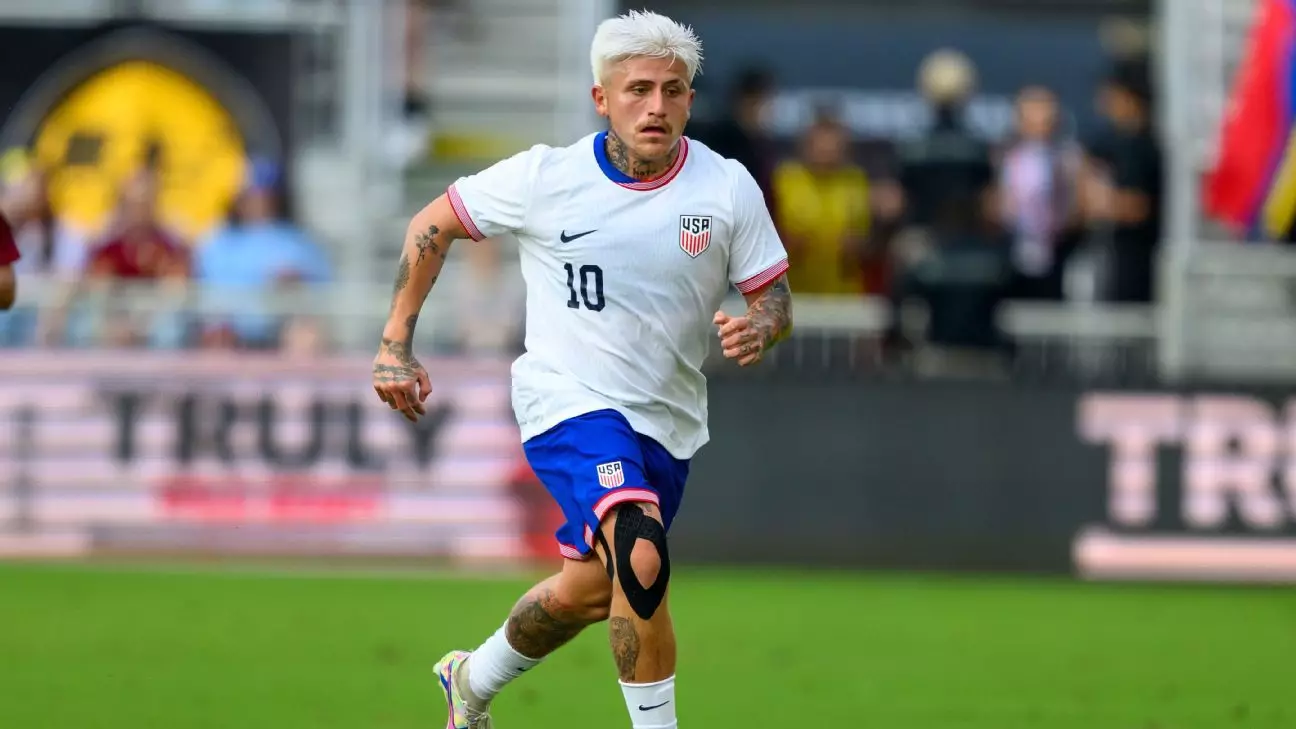Diego Luna’s journey in professional soccer is a testament to resilience, creativity, and an innate ability to navigate personal and professional challenges. At just 21 years old, the Real Salt Lake midfielder embodies a unique blend of talent and introspection that sets him apart from his peers. While many young athletes grapple with finding their footing in the competitive landscape of professional sports, Luna has demonstrated a remarkable capacity for self-awareness and growth that continues to propel him forward.
This month, Luna is participating in the U.S. men’s national team training camp under renowned coach Mauricio Pochettino. He recently earned his second cap in a friendly match against Venezuela, where he displayed his skill in maintaining possession amidst pressure. Born and raised in Sunnyvale, California, Luna’s path to this point reflects his steadfast commitment to trust his instincts and make unconventional choices. Whether relocating to the Barcelona Residency Academy at 15, playing in the USL Championship, or ultimately joining Real Salt Lake, each step has shaped his career.
Luna’s journey is grounded in the philosophy that timing is crucial. Reflecting on his experiences, he mentions, “It’s all about timing and when something’s going to happen for you.” This mindset highlights a maturity beyond his years, revealing a player who is aware that success often comes from preparation meeting opportunity. His performance recently in the January camp illustrates just how prepared he is for the next stage of his career.
In a sport often characterized by a standardized approach to training and performance, Diego Luna stands out as “a little bit different.” This phrase has become synonymous with his playing style, representing a creative spark that is rarely seen in American soccer. Critics and fans alike have noted his exceptional ability to read the game, find crucial passes, and contribute to both offensive and defensive plays.
However, Luna’s journey to recognition was not without its challenges. During his early days in the San Jose Earthquakes academy, he faced skepticism regarding his fitness and physique. Evaluators noted his “barrel-chested” form as a liability, but with the support of the Quakes’ coaching staff, they managed to highlight his complex skill set. This obstacle illustrates a critical point in Luna’s narrative — the importance of advocating for oneself and enduring through initial judgments to ultimately prove detractors wrong.
Tony Lepore, the head of talent identification for the U.S. Soccer Federation, acknowledged that physical development is not linear, and Luna’s experience exemplifies the need to exercise patience and understanding regarding player growth. The narrative surrounding his body type merely scratches the surface of the metaphorical differences that have defined Luna’s approach to the game.
Beyond the physical aspects, Luna’s growth has been influenced significantly by his ability to engage with his inner voice. Raised in a soccer-centric family with a rich history in the sport, including a father who played professionally, Luna found himself questioning his identity both on and off the field. The decision to become a barista highlights his introspective nature — not merely a way to earn money, but a proactive strategy to improve his social skills and enhance his confidence.
Luna’s willingness to embrace therapy as a means of self-improvement illustrates a modern understanding of mental health that many athletes overlook. Recognizing the complexities of being a professional soccer player, he understands that performing at a high level requires both physical and psychological readiness. In doing so, he acknowledges his vulnerabilities, empowering him to navigate the intricacies of his career more effectively.
The emotional weight he carries due to family dynamics adds another layer to his narrative. While soccer remains the unifying force within his family, Luna reflects on the disconnect between shared experiences on the field and deeper familial relationships. The decision to seek therapy was a pivotal moment in his life, allowing him to process emotions and challenges that once felt insurmountable. This candid perspective emphasizes the importance of mental well-being as an integral part of an athlete’s journey.
Luna’s approach to his soccer career has been unorthodox yet highly effective. Departing the traditional academy route for the USL Championship allowed him to develop his skills in a nurturing environment. Coaches such as Mark Lowry and John Hutchinson recognized his potential, fostering an atmosphere that encouraged creative expression on the pitch. His performance with El Paso Locomotive proved vital; 13 goals across 41 matches in the USL demonstrated his readiness for higher competition.
As he made his way to Real Salt Lake, the excitement of competing at a higher level was shadowed by a sense of isolation. Luna turned to barista work yet again, viewing it as an opportunity to refine essential life skills amid the competitive chaos of soccer. Facing challenges from both family and professional fronts, he remained steadfast, committed to personal growth.
His persistence has borne fruit — Luna’s recent successes on the field, including the prestigious Young Player of the Year award, have demonstrated a remarkable transformation. RSL manager Pablo Mastroeni acknowledges this growth, celebrating Luna not only for his technical abilities but also for his evolution into a multifaceted player capable of influencing the game in multiple dimensions.
While the path has been fraught with obstacles, Diego Luna stands poised at the threshold of greater achievements. His experience with the national team offers a tantalizing glimpse of what might come next. In navigating the crossroads of professional soccer and personal aspiration, Luna is emblematic of a new generation of athletes — one that recognizes the importance of mental health and holistic growth.
His potential to contribute to the U.S. Men’s National Team is significant, though he remains open to exploring opportunities that may arise as he continues to carve out his niche. Through dedication and an unwavering commitment to self-discovery, Diego Luna exemplifies what it means to thrive in the world of sport, proving that sometimes, it takes a little bit of a different path to truly succeed.

